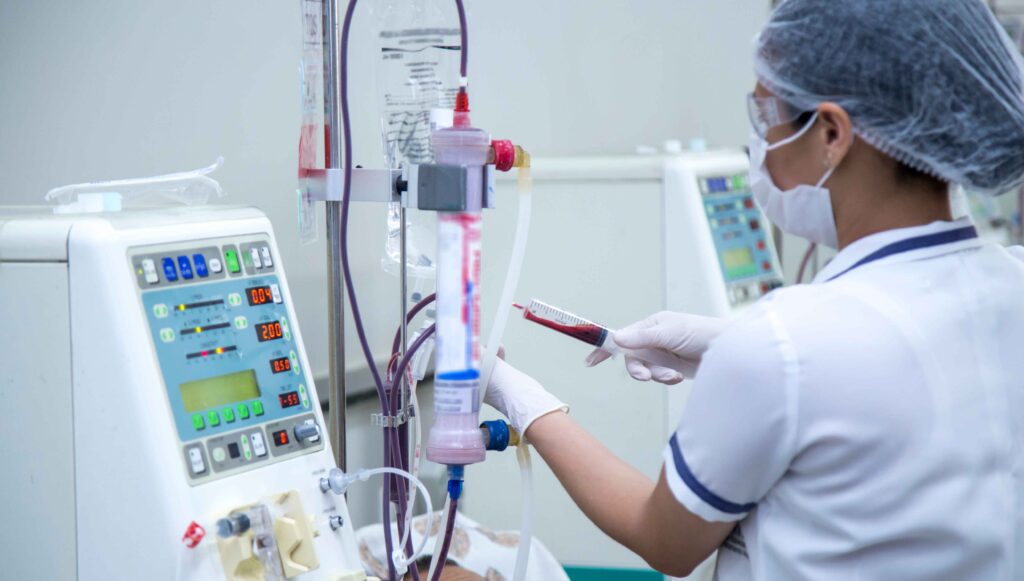Any new dialysis patient may feel anxious or nervous. Dialysis is an essential function for patients with kidney failure, and removes waste and fluid from the body even if you are a new patient. Meaningful dialogue with your doctor can make your first dialysis experience feel more comfortable and less scary. Once you have a review for the right question to prepare – it can reduce your anxiety, and you become an engaged member of your care plan. Below are a few questions to consider asking your doctor…
What is the duration of dialysis treatment?
A major thing to wrap your head around is how long and often you will do dialysis, to try and consider it into your routine schedule and daily life. Typically, hemodialysis is done 3 times a week and lasts anywhere between 3-4 hours per session. For peritoneal dialysis, it will take some time as you still need to do it for a certain amount of time, but there is lower structure, it could take 30 minutes or could take 8 hours, it will be more continuous.
Where will your dialysis occur?
Determine the location of your dialysis. Will you go to a specific site, or can you receive treatment at home? This will assist you in planning transportation and preparing anything ahead of time; something to keep in mind.
Also Read: Manage the Side Effects of Dialysis to Enhance Quality of Life?
What are some of the possible risks and complications
Dialysis replacement therapy is a life-sustaining treatment but it can have the potential for complications. This topic can be discussed with your doctor, however, just simply, as the patient, here are some examples of complications that arise when undergoing treatment, these risks include infections, blood clotting, blood pressure changes, and/or immediate side effects during and following treatments. Understanding some of the potential symptoms can help you know when to discuss your concerns with your doctor, nurse or any caregiver, for possible medical concerns.
What modifications to your lifestyle are recommended?
Dialysis can change your lifestyle and diet. Consult your health care provider concerning changes to your diet, what foods are to be eaten and what foods to avoid, how much fluid to take in, and if there is medication you will be required to take. The more you understand about food, diet changes and what you are to avoid, the more likely you will remain as healthy as possible while receiving dialysis treatment.
Can I keep taking the medications?
Be sure to inform your doctor of all the medication you currently are taking, including over-the-counter medications and supplements. A few of these medications don’t function quite as well with dialysis, or simply require changing to fit the treatment. Your doctor will take a moment to sit down with you and help you figure out what to stay on and what to change.
Is there anyone or any support group
Kidney failure and dialysis can be hard on the emotions. Discuss with your doctor organizations where you can meet others with the same circumstances, counseling service, or other types of support that can enable you to cope with the physical and emotional aspects of your care. For instance, NephroPlus has partnered with LISSUN, an online mental health site that provides one-on-one counseling sessions to dialysis visitors and their guardians.
Conclusion,
Having the right questions in hand before starting dialysis can ease anxiety, build confidence, and allow you to be an active participant in your treatment process. By asking your doctor questions regarding treatment schedules, sites, risks, adjustments to your lifestyle, medication, and emotional support, you are equipped with the knowledge necessary to move through dialysis with less difficulty.
Frequently Asked Questions
Q. At which creatinine level is dialysis required?
5.0-7.0 mg/DL
Q. How long after starting dialysis do you feel better?
One to two week
Q. Can kidney function improve without dialysis?
Yes, in some cases, kidney function may improve even without dialysis by taking care of the underlying cause, ea
Q. What happens if you delay dialysis?
Delaying dialysis causes the hazardous accumulation of waste products and fluid in the body, resulting in fluid overload,
Q. Is a 4.5 creatinine level bad?
Actually, a creatinine level of 4.5 mg/dL is highly abnormal and an emergency level that signifies heavily compromised renal function.



